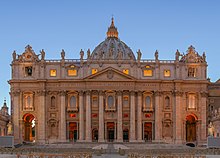
Back علم اللاهوت الكاثوليكي Arabic Katolická teologie Czech Diwinyddiaeth Gatholig Welsh Katholische Theologie German Katolika teologio Esperanto Teología católica Spanish Théologie catholique French Teologi Katolik ID Teologie catolic Interlingue 가톨릭 신학 Korean
| Part of a series on the |
| Catholic Church |
|---|
 |
| Overview |
|
|
Catholic theology is the understanding of Catholic doctrine or teachings, and results from the studies of theologians. It is based on canonical scripture, and sacred tradition, as interpreted authoritatively by the magisterium of the Catholic Church.[1][2] This article serves as an introduction to various topics in Catholic theology, with links to where fuller coverage is found.
Major teachings of the Catholic Church discussed in the early councils of the church are summarized in various creeds, especially the Nicene (Nicene-Constantinopolitan) Creed and the Apostles' Creed. Since the 16th century the church has produced catechisms which summarize its teachings; in 1992, the Catholic Church published the official Catechism of the Catholic Church.[3][4]
The Catholic Church understands the living tradition of the church to contain its doctrine on faith and morals and to be protected from error, at times through infallibly defined teaching.[5] The church believes in revelation guided by the Holy Spirit through sacred scripture, developed in sacred tradition and entirely rooted in the original deposit of faith. This developed deposit of faith is protected by the "magisterium" or College of Bishops at ecumenical councils overseen by the pope,[6] beginning with the Council of Jerusalem (c. AD 50).[7] The most recent was the Second Vatican Council (1962 to 1965); twice in history the pope defined a dogma after consultation with all the bishops without calling a council.
Formal Catholic worship is ordered by means of the liturgy, which is regulated by church authority. The celebration of the Eucharist, one of seven Catholic sacraments, is the center of Catholic worship. The church exercises control over additional forms of personal prayer and devotion including the Rosary, Stations of the Cross, and Eucharistic adoration, declaring they should all derive from the Eucharist and lead back to it.[8] The church community consists of the ordained clergy (consisting of the episcopate, the priesthood, and the diaconate), the laity, and those like monks and nuns living a consecrated life under their constitutions.
According to the Catechism, Christ instituted seven sacraments and entrusted them to the Catholic Church.[9] These are Baptism, Confirmation (Chrismation), the Eucharist, Penance, the Anointing of the Sick, Holy Orders and Matrimony.
- ^ Catechism of the Catholic Church (2nd ed.). Libreria Editrice Vaticana. 2019. Paragraphs 74–95.
- ^ Catechism of the Catholic Church (2nd ed.). Libreria Editrice Vaticana. 2019. Paragraphs 1953–1955.
- ^ Marthaler, Berard L., ed. (1994). "Preface". Introducing the Catechism of the Catholic Church: Traditional Themes and Contemporary Issues. New York: Paulist Press. ISBN 978-0-8091-3495-3.
- ^ John Paul II (1997). "Laetamur magnopere". Vatican. Archived from the original on 11 February 2008. Retrieved 9 March 2008.
- ^ Catechism of the Catholic Church (2nd ed.). Libreria Editrice Vaticana. 2019. Paragraph 891.
- ^ McManners, John, ed. (2001). "Chapter 1". Oxford Illustrated History of Christianity. Oxford: Oxford University Press. pp. 37–38. ISBN 978-0-19-285439-1.
The 'synod' or, in Latin, 'council' (the modern distinction making a synod something less than a council was unknown in antiquity) became an indispensable way of keeping a common mind, and helped to keep maverick individuals from centrifugal tendencies. During the third century synodal government became so developed that synods met not only at times of crisis but on a regular basis every year, normally between Easter and Pentecost.
- ^ McManners, John, ed. (2001). "Chapter 1". Oxford Illustrated History of Christianity. Oxford: Oxford University Press. p. 37. ISBN 978-0-19-285439-1.
In Acts 15 scripture recorded the apostles meeting in synod to reach a common policy about the Gentile mission.
- ^ "Sacrosanctum concilium". www.vatican.va. 13. Retrieved 29 December 2017.
- ^ Catechism of the Catholic Church (2nd ed.). Libreria Editrice Vaticana. 2019. Paragraph 1131.
© MMXXIII Rich X Search. We shall prevail. All rights reserved. Rich X Search